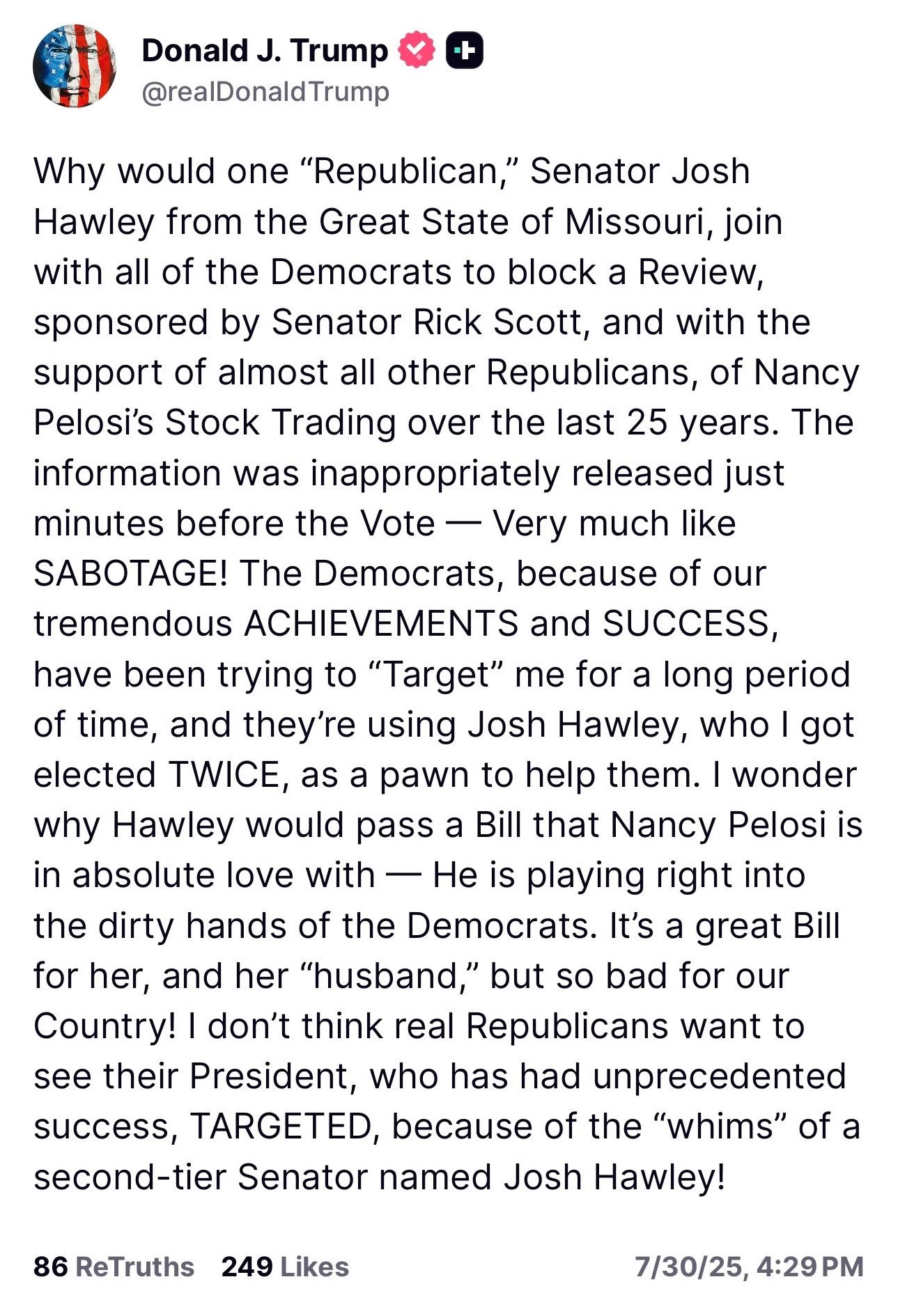Left and Right and Dangerous, &c.
On extremes, pilgrims (political), Kolakowskis (heroic), the Trumpian temper, Mendelssohnian perfection, and more

As you may have heard—and seen for yourself—extreme Left and extreme Right are not polar opposites. They are more like kissing cousins. I have known people who went from one extreme to the other. They were not all that changed, in their second phase.
There has been a death in Berlin. The Associated Press reports,
Horst Mahler, a founding member of the left-wing Red Army Faction militant group who later became a right-wing extremist and accumulated a series of convictions, including for Holocaust denial, has died, a lawyer who represented him said Monday. He was 89.
In the last several years, I have not been sure whether “Left vs. Right” makes much sense. It seems to me that the great contest is between liberal democracy and its enemies. Between liberalism and illiberalism, if you like.
What is Putin, by the way? Is he left-wing or right-wing? He is a former KGB colonel who has re-Sovietized Russia. Yet he is admired by people on the nationalist-populist right throughout the world.
I have long said, “They ought to get a room,” the extreme Left and the extreme Right—and stay there, letting the rest of us alone.
***
Let me pause for a language note: There are about eleven of us left in the world who preserve the distinction between “to leave alone” and “to let alone.” Soon, there will be none—and the world will be both left and let alone on the subject ...
***
In recent days, I have been thinking about Paul Hollander, the sociologist and all-around intellectual who fled Hungary in 1956 for a life in America. I got to know him in the late 1990s, I think. (Hollander died in 2019.) I wrote about him in 2002, when I reviewed a collection of his, Discontents: Postmodern & Postcommunist. (For my review, go here.)
Paul was known, primarily, for a 1981 book, Political Pilgrims: Travels of Western Intellectuals to the Soviet Union, China, and Cuba. Later, this book acquired a different subtitle: “Western Intellectuals in Search of the Good Society.”
Hollander might like to update his book, or expand on it.
In the last ten years, there have been many pilgrims to Orbán’s Hungary. And to Putin’s Russia.
Have you read about the Huffman family? They are not intellectuals, but they picked up from America and moved to another country, “in search of the good society.” The Huffmans lived in Texas. But the patriarch decided that the society suffered from gay propaganda, so he moved his wife and three children, along with himself, to Russia. He was promptly conscripted into the Ukraine war.
This is a tragic case. In their own ways, two friends of mine have written about it. To read Jonathan V. Last, go here. And to read Garry Kasparov, go here.
Political pilgrims, of one kind or another, we will always have with us.
***
Being from Michigan, I take a special interest in news from that state, and I fastened on an AP report out of Traverse City:
Matthew Kolakowski was shopping for fishing gear and snacks with his daughter at a Michigan Walmart over the weekend when he heard an employee yelling “he’s got a knife” followed by sounds of screaming.
Kolakowski took it upon himself to stop this ghastly and bloody attack. I found it stirring, to read about him.
My favorite Kolakowski since Leszek.
***
In early 2017, lots of people asked, “But is that behavior presidential?” Newt Gingrich, defending Donald Trump, said something like this: “If the president does it, it is, by definition, ‘presidential.’” That was at the same time sophistic and hard to argue with.
(I believe there is such a thing as “un-American” behavior, even if Americans—lots of them, lots of us—engage in it.)
The other day, Trump emitted this:
I don’t know who Jessica Tarlov is. But I know, or feel I know, that a president ought not to behave this way.
Have a look at this, too:
There is a lot to “unpack” here. But I would like to focus on one detail: Trump puts quotation marks around “husband.” Nancy Pelosi and “her ‘husband.’” He does the same thing when tweeting, or “truthing,” about Mitch McConnell and Elaine Chao—“his ‘wife.’”
The American people put this vileness in the Oval Office—twice—which says more about us than about the occupant of that office.
***
A headline from the New York Times: “Top F.D.A. Official Resigns Under Pressure.” The subheading reads, “After turning down several new drugs and restricting use of another, Dr. Vinay Prasad drew the ire of the right-wing influencer Laura Loomer and others.” To read the article, go here.
I thought of something that Trump said last year, when he was paying tribute to Loomer at Mar-a-Lago: “You don’t want to be Loomered. If you’re Loomered, you’re in deep trouble. That’s the end of your career, in a sense.”
***
On social media, lots of people are baying for the head of Jerome Powell, the chairman of the Federal Reserve. He was appointed by Trump in 2018. But now Trump is bad-mouthing him virtually non-stop. And Trump Nation is following suit.
These people know as much about monetary policy as they do about Petrarch or Bach. I swear, if Trump decided apple pie was bad, they might seek to ban it. They might even boycott Apple products.
I think of a phrase, derived from MAGA itself: “sheeple.”
***
“GOP bill seeks to rename Kennedy Center for Trump.” Of course. The article also tells us that Republicans are trying to rename the center’s opera house for the First Lady, Melania Trump.
Has she ever actually seen an opera? (Most people haven’t, having other interests.) Is there any limit to the idolatry and suck-uppery on display today?
***
Ozzy Osbourne, the rocker and reality-TV star, died about a week ago. I was hoping that Kevin Williamson would write a piece—he is something of an Ozzy-ologist. He has, here. Kevin also knows a thing or two about Johnny Rotten, the punk icon. That will be a heck of an appreciation, when the time comes ...
***
In the next issue of The New Criterion, I will discuss a concert whose program included the Mendelssohn Violin Concerto. Reading the evening’s program notes, I thought of a remark made long ago—mid-’90s—by a colleague of mine. Let me quote those program notes, written by Jack Sullivan:
Felix Mendelssohn’s Violin Concerto in E Minor is by common consent a near-perfect piece—one where orchestration and melody, structure and feeling, form and content, Romantic sensibility and Classical restraint are indivisibly united, and where the strengths and limitations of the solo instrument are expertly gauged.
I agree with the consensus, by the way. “Yet in music,” Mr. Sullivan continues,
perfection is not always considered an unambiguous virtue: For years, Mozart was judged inferior to Beethoven precisely because his music was more perfect, less “gnarled” and “tortured.” Mendelssohn has suffered a similar fate; his wit and refinement are often considered too perfect (“confoundedly genteel,” in the words of George Bernard Shaw) to be truly great.
One more sentence:
This prejudice is less pronounced in literature: Not many readers complain about the “civilized” perfection of Jane Austen or Wallace Stevens.
To read Jack Sullivan’s program notes in their entirety, go here.
My memory: One of the most interesting criticisms I have ever heard was made by a learned colleague of mine about V. S. Naipaul. “He is too perfect. He writes too limpid a prose.” That is something to ponder, and debate, for a long time ...
***
“Connie Francis, Whose Ballads Dominated ’60s Pop Music, Dies at 87.” I would like to highlight one section of William Grimes’s highly interesting obit. It says something about art—musical art, literary art, etc. Here we go:
As she outgrew the child-star category, Ms. Francis obtained forged documents and began singing in clubs and lounges. Imitating the vocal styles of stars like Patti Page and Rosemary Clooney, she made demonstration tapes for music publishers who wanted to place their songs with famous singers.
In 1955, she signed a contract with MGM Records, and over the next two years she recorded 10 singles, all of them flops. “The bombs just kept a-comin’,” she wrote in “Who’s Sorry Now?,” her 1984 memoir ... “They were becoming my trademark, a foregone conclusion.”
Down to her last record and ready to quit show business to attend college, Ms. Francis gave in to her father’s wishes and recorded “Who’s Sorry Now,” a song she loathed because she thought it sounded old-fashioned. It was first heard on Dick Clark’s television show “American Bandstand” on Jan. 1, 1958, and sold a million copies in the next six months.
“It was the first time I ever recorded that I didn’t try to imitate somebody else,” Ms. Francis told Gary James in an interview for classicbands.com in 1994. “I hated the song so much that I didn’t care what I sounded like. So I just sang it.”
Oh, my gosh, there is a lesson here.
***
Over the years, I have published bird photos—striking photos—by Hans Goeckner, a reader of ours who is a physicist in Chicago. He has sent me one of a Great Blue Heron, having “a long drink of cool water” (as Hans says).
I have a few photos myself, but I can’t match the Great Blue. So I will sign off, thanking you and wishing you the very best.






I remember Bandstand before it became American Bandstand in 1957, when it went from a local Philadelphia TV show to nationwide. My older sisters were in high school and watched it every day after school. I was in early on the birth of Rock 'n Roll!
Quoting Sullivan, "For years, Mozart was judged inferior to Beethoven precisely because his music was more perfect, less 'gnarled' and 'tortured.'"
I think I know what's meant by statements like that, but I also find it odd to associate characteristics I associate with much of Mozart's music – frothiness, poise – with "perfection". A professional musician remarked to me earlier this year that he wished Mozart had written more music like the Kyrie fugue in Mozart's Requiem, which I heartily agreed with – and we'd find it odd to call the fugue more "imperfect"! Rather, it suitably expresses the fervor of the text. "Lord have mercy!" isn't a serene statement, and more placid or upbeat settings risk liturgically inappropriate self-satisfaction.
I would likewise find it odd to call Byrd's "Ave Verum Corpus" less perfect than Mozart's. I happen to prefer Byrd's, partly because I find placidity with which Mozart sets the text somewhat confusing. I wonder if those who prefer Mozart's interpret the elevation and adoration of the Eucharist differently from how I would. (I'm Christian but not Catholic, so there are specifically Catholic approaches to reverencing the Eucharist I don't fully understand.)
https://www.youtube.com/watch?v=f9P_RyHWdVs
For music that sets text, Luzzaschi's approach seems hard to beat: "Since poetry was the first to be born, music reveres and honors her as his lady, so much so that music, having become virtually a shadow of poetry, does not dare move its foot where its superior has not gone before. From this it follows that if the poet raises his style, the musician raises his tone. He weeps if the verse weeps, laughs if it laughs; if it runs, stops, implores, denies, screams, falls silent, lives, dies, all these affects and effects are so vividly expressed in music that what should properly be called resemblance seems more like rivalry."